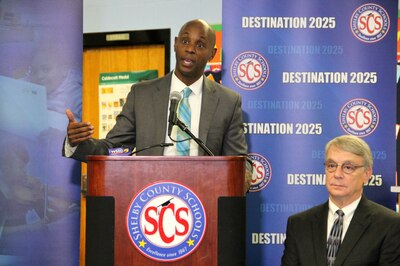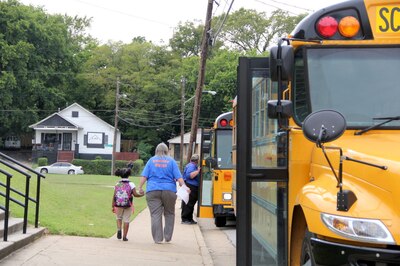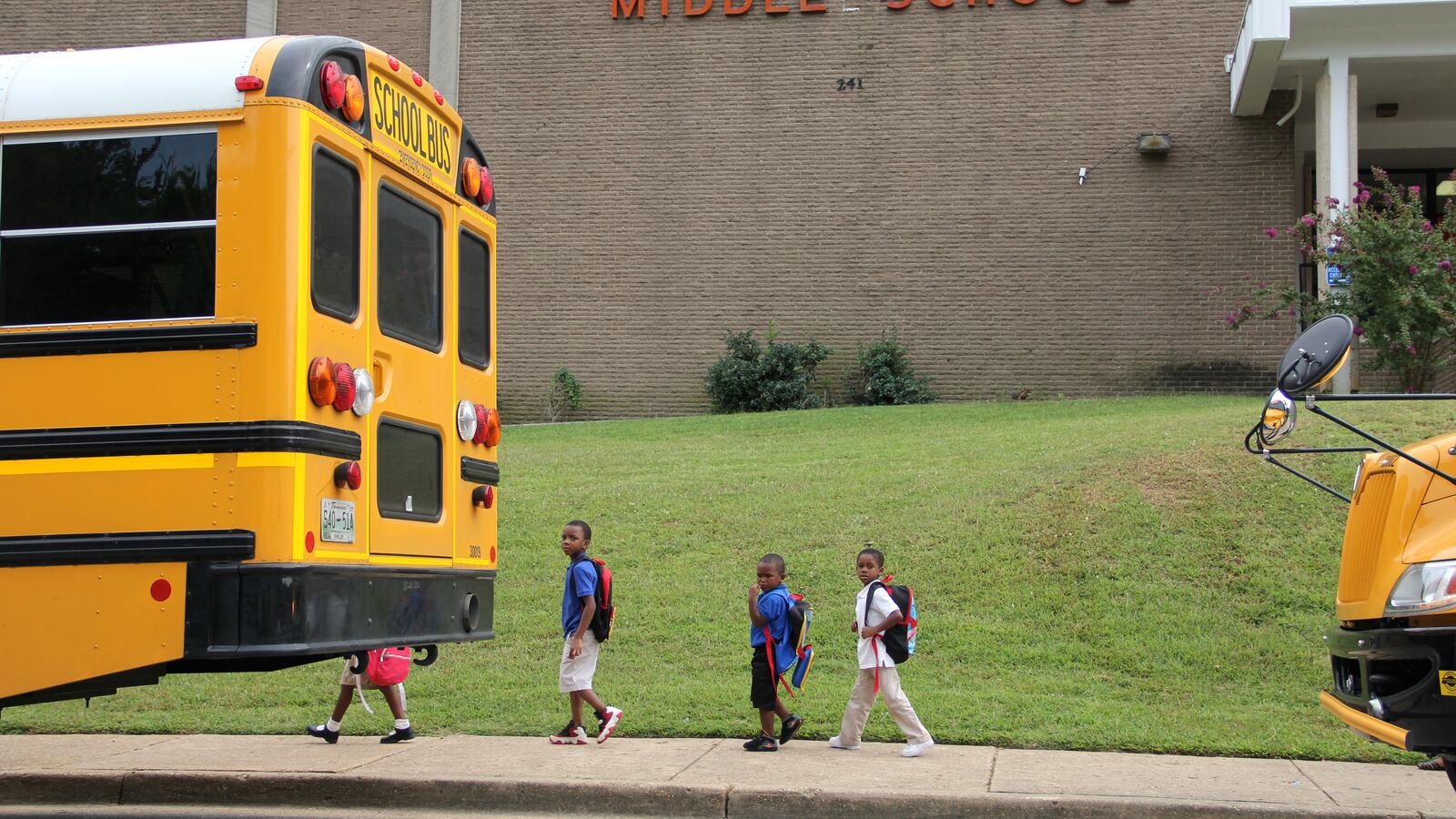Riverview School is tucked in a hilly neighborhood that hugs the Mississippi River just south of downtown Memphis. Its twisting roads are marked with potholes, littered with trash and lined with liquor stores, makeshift churches and burned or abandoned homes. Recently, the local district attorney declared the neighborhood a nuisance zone for roving street gangs that regularly exchange gunfire. With the average family bringing in less than $10,000 a year, it is one of the poorest census tracts in America.

Against this backdrop, Shelby County Schools Superintendent Dorsey Hopson opted to announce on Monday that the district’s school board has filed a lawsuit against the state of Tennessee for failing to live up to its constitutional obligation to provide its students an adequate education.
The state’s unwillingness to adequately fund its schools disproportionately impacts Memphis’ poor, black and disabled children, the lawsuit said.
“When you have some of the suffocating poverty that we have, to get to the results we’re trying to get to, it takes resources,” Hopson said in a news conference held in Riverview’s media center.
The 38-page lawsuit may provide the most detailed narrative yet of how five years of cutting close to $575 million from Memphis schools has impacted its neediest children.
Riverview, which serves 516 students in kindergarten through the eighth grade, could serve as the poster child for the district’s case against the state, say administrators. In the last five years, more than eight schools have been closed in bordering neighborhoods, sending a large portion of those students to Riverview and causing annual social and academic upheaval for the community.
Under annual budget cuts, the school axed its foreign language program and reduced its gifted program to just one hour a week. There are no sports fields for its middle schoolers to host home games. Band was almost cut this year, but the principal pulled funds from another account to keep the program alive.
“Because of the lack of funding,” the lawsuit contends, “the district is unable to provide many of these impoverished, mainly-minority students with an education that would allow them to achieve the outcomes mandated by the Tennessee Constitution, given the high-density urban setting in which the district operates, nor an education that is substantially equal to the education received by other students in the state.”
In descriptive, bulleted detail, the suit details dilapidated facilities, annual staff layoffs, and federally mandated course offerings and services axed. The district, under pressure by the state to boost its lagging test scores but without the money needed to do so, struggles to adequately evaluate its teachers or properly prepare students for tests, the lawsuit says.
The brief, filed by a law firm in Wichita, Kan., was based on hours of testimony from administrators, teachers and parents across Tennessee’s largest district, serving 109,000 students. Some administrators broke down in tears while describing the conditions in which students were coming to school, and their own inability to meet the students’ needs.

“The suggestion that Shelby County Schools or any school district in Tennessee should accept this and should sacrifice a generation of students because the state of Tennessee has failed to fulfill its constitutional responsibility is unacceptable,” board member Chris Caldwell said during Monday’s news conference. “Our students don’t get these years back and their future opportunity to lead a successful life is harder to achieve because of it. All Tennessee children and their families deserve better than this.”
Shelby County is 82 percent black and its students speak more than 50 languages. Its test scores rank amongst the lowest in the state, with just 30 percent of its elementary students reading at grade level.
District budget cuts are due to a host of factors. Sales and property tax revenue decreased during the recession and, in recent years, the district has lost thousands of students — and the federal, state and local tax dollars that come with them — to surrounding districts and a growing crop of charter schools.
Exacerbating the challenges, the lawsuit contends, has been the state’s inability to properly fund its Basic Education Program, or BEP, a complex formula for distributing education funding across the state. The lawsuit charges that the BEP grossly miscalculates the costs of education and demands that the state invest millions of more dollars into public K-12 education, as well as vastly expand its pre-kindergarten offerings. A victory could bring at least $100 million more a year to Shelby County Schools alone, administrators say.
Gov. Bill Haslam and other state education leaders have declined to comment on the pending litigation involving Shelby County or another funding-related lawsuit filed last March by seven southeastern Tennessee districts led by Hamilton County Schools in Chattanooga. The Shelby County suit’s focus is education funding for the district’s mostly minority, mostly poor population, which is why Memphis leaders chose to file a separate suit rather than join the Hamilton County litigation.
Robert Gowan, a lobbyist for the Coalition of Large Area School Systems, said the current litigation will be different from the 1988 lawsuit by 77 small school systems that claimed that the state’s education funding formula was inequitable and forced the creation of the BEP.
“It’s not going to be a case where you had with small schools a zero-sum game and small schools benefitted at the expense of large districts,” Gowan said. “These lawsuits are about adequacy and not equity. They’re not talking about how the pie is distributed. This is about trying to make the pie bigger.”
Hopson has said his administration has tried to protect the classroom when making budget cuts. But the lawsuit makes clear that those cuts have not only hit the classroom; they have hit every aspect of the school day.
The district transports students to school at 7 o’clock in the morning because “the operations side of the district is often cannibalized in a way that cuts services ‘to the bone,'” according to the lawsuit. Schools sometimes go weeks without heat in the winters and air conditioning in the spring and summer. Roofs are in disrepair, pipes leak, and staff have to close portions of buildings due to mold. While the state forbids districts from charging poor students to participate in extracurricular activities, Shelby County Schools charges them anyways to keep the activities alive.
“Somebody has to pay for them,” said Valerie Speakman, the district’s lawyer.
This past summer, the district cut 367 staff positions, including 41 central office jobs. That includes virtually all of its family specialists, the majority of its social workers, guidance counselors, reading intervention specialists and tutors.
School enhancements such as home economics, art, music and drama classes no longer exist at many Memphis high schools. And seniors are regularly pulled from foreign language classes — a course required to graduate — to make room for younger students.
Last year, Treadwell Elementary School couldn’t provide its staff with the training or resources to adequately respond to a surge of immigrants from Yemen and Honduras, according to the lawsuit.
Classes at the district’s four alternative schools for some of the city’s hardest-to-reach students are overcrowded and lack adequate security. If the student is in middle or high school, they have to find their own modes of transportation. Many don’t.
In addition, the district is unprepared for the state’s new TNReady achievement test to be administered online. During a pilot test run last school year, many schools experienced school-wide computer crashes because of outdated wiring and low-capacity technical infrastructures. Some schools don’t have enough computers.
Despite the cuts, the district has managed to boost test scores, a point Hopson attributed to innovative tactics and his hard-working staff. But it also may show that the state’s heavy focus on test score growth hides the lack of enrichment that occurs in schools.

At Riverview, which made a big push to get students to show up to school on time this year, principal LaTasha Harris said she and her staff have doubled as social workers, providing students with toothpaste, deodorant and free haircuts.
The task can be overwhelming at times. On a recent day as the last school bell rang at 4:15 p.m. and children exited the building, many teachers also emerged, holding students’ hands as they directed them to the right school buses.
“We’re everything to these kids,” Harris said.


